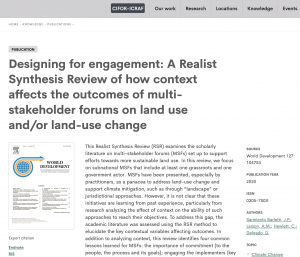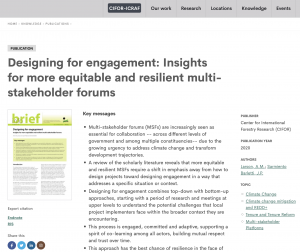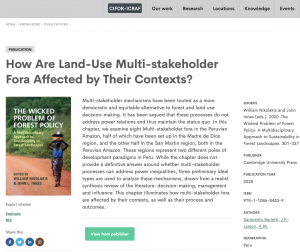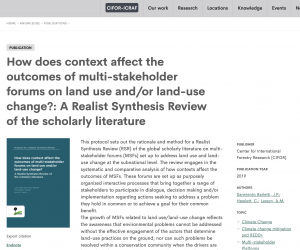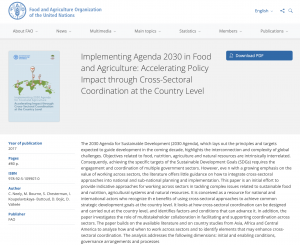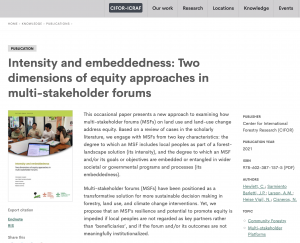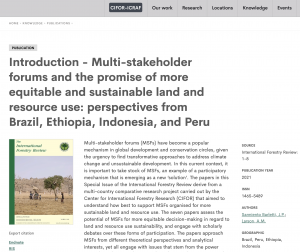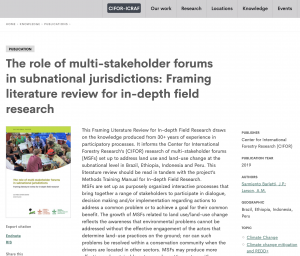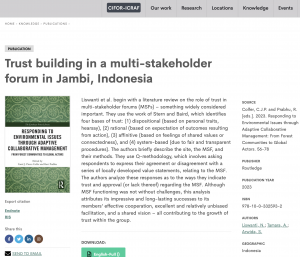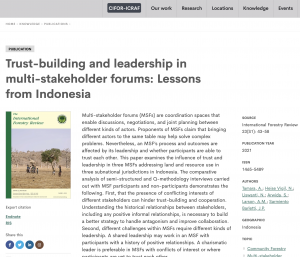Category: Knowledge
Designing for engagement: A Realist Synthesis Review of how context affects the outcomes of multi-stakeholder forums on land use and/or land-use change
This Realist Synthesis Review analyses scholarly literature on multi-stakeholder forums (MSFs) for sustainable land use. It focusses on subnational MSFs involving grassroots and government actors. The review highlights key contextual variables and identifies four common lessons: commitment, engagement of implementers, openness to stakeholders, and adaptive design. Successful MSFs are recognized as part of a transformative process, involve research and meetings, build consensus and commitment, and prioritize adaptive learning. The central lesson is to design for engagement that addresses the context for greater success.
Designing for engagement: Insights for more equitable and resilient multi-stakeholder forums
A process that is engaged, committed and adaptive allows for all actors to build trust, and thus has the best chance of success moving forward. This literature review highlights the importance of engagement within an MSF.
How are land-use multi-stakeholder fora affected by their contexts?
This chapter examines the effectiveness of multi-stakeholder mechanisms in addressing power relations in forest and land use decision-making. It analyzes eight multi-stakeholder fora in the Peruvian Amazon, specifically in the Madre de Dios and San Martin regions. The chapter uses three ideal types (decision-making, management, and influence) to analyze these mechanisms based on a review of the literature. It highlights the influence of context, processes, and outcomes on the functioning of multi-stakeholder fora.
How does context affect the outcomes of multi-stakeholder forums on land use and/or land-use change?: A Realist Synthesis Review of the scholarly literature
This protocol outlines a Realist Synthesis Review (RSR) that analyses the global scholarly literature on multi-stakeholder forums (MSFs) addressing land use and land-use change. MSFs bring diverse stakeholders together to address common challenges and achieve shared goals. The review aims to understand how contextual factors influence MSF outcomes. It contributes to the study of MSFs and participatory processes, addressing concerns about top-down approaches and emphasizing meaningful engagement. The RSR methodology provides empirical insights and advances social science research methods.
Implementing Agenda 2030 in Food and Agriculture: Accelerating Policy Impact through Cross-Sectoral Coordination at the Country Level
The 2030 Agenda for Sustainable Development emphasizes the interconnectedness of global challenges and the need for cross-sectoral collaboration. However, there is limited guidance on how to integrate such approaches into national and sub-national planning. This paper aims to provide indicative approaches for working across sectors to address complex issues related to sustainable food and nutrition, agriculture, and natural resources. It offers insights on cross-sectoral coordination at the country level, identifies factors that facilitate it, and explores the role of multistakeholder collaboration in supporting coordination. Drawing on literature and country studies, the analysis focuses on initial conditions, enabling factors, governance arrangements, and processes for effective cross-sectoral coordination.
Intensity and embeddedness: Two dimensions of equity approaches in multi-stakeholder forums
This paper introduces a novel approach to studying multi-stakeholder forums (MSFs) in the context of land use and land-use change, focusing on their equity implications. The authors analyse MSFs based on two key characteristics: the extent to which local communities are actively involved (intensity) and the extent to which the forum is integrated into broader societal or governmental processes (embeddedness). By employing these analytical tools, the paper offers nuanced insights into how different MSF approaches function and their impact on equity, going beyond simplistic categorizations and providing a deeper understanding of MSF dynamics.
Introduction – Multi-stakeholder forums and the promise of more equitable and sustainable land and resource use: perspectives from Brazil, Ethiopia, Indonesia, and Peru
This Special Issue of the International Forestry Review presents a multi-country comparative research project by CIFOR, exploring the potential of multi-stakeholder forums (MSFs) as participatory mechanisms for sustainable land and resource use. The seven papers analyse power inequalities inherent in MSFs and discuss their capacity for equitable decision-making. While approaching MSFs from different perspectives, the papers emphasize the need for transformative MSFs that go beyond mere participation to achieve meaningful change.
The role of multi-stakeholder forums in subnational jurisdictions: Framing literature review for in-depth field research
Drawing on 30+ years of experience, this Literature Review informs CIFOR's research on multi-stakeholder forums addressing land use in Brazil, Ethiopia, Indonesia, and Peru. It explores the potential of MSFs to coordinate goals effectively while cautioning against token participation and aims to contribute to the study of participatory processes in the context of climate change.
Trust building in a multi-stakeholder forum in Jambi, Indonesia
Liswanti et al. examine trust in multi-stakeholder forums (MSFs) through a literature review and Q-methodology analysis, finding that effective cooperation, unbiased facilitation, and a shared vision foster trust and contribute to the success of MSFs.
Trust-building and leadership in multi-stakeholder forums: Lessons from Indonesia
This paper investigates the impact of trust and leadership in multi-stakeholder forums (MSFs) addressing land and resource use in Indonesia. Conflicting interests can hinder trust-building, requiring an understanding of historical relationships to improve collaboration. Different challenges within MSFs call for specific leadership styles, including shared leadership for positive relationships and charismatic leadership for conflicts of interest or lack of trust.


